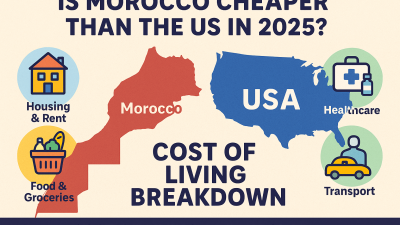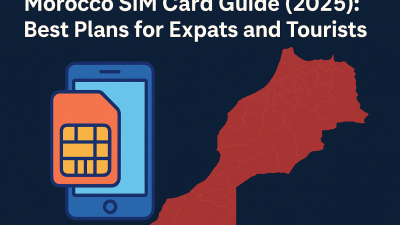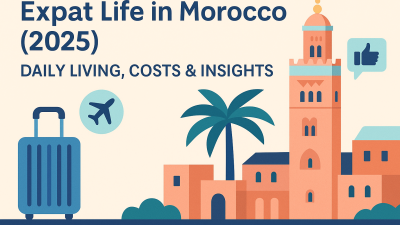Top Banks in Morocco for Expats (2025 Guide)
If you’re planning to live, work, or retire in Morocco, opening a local bank account is one of the smartest first steps. It simplifies everything — from paying rent and utilities to receiving international transfers. In this guide, we’ll walk you through the best banks for expats in Morocco in 2025 and how to open your account smoothly.
1. Attijariwafa Bank
One of the biggest and most well-known banks in Morocco, Attijariwafa is a solid choice for everyday banking. It’s available in nearly every city and town, and they offer accounts that are relatively easy for expats to open.
Pros:
- Widely available branches and ATMs
- Mobile banking app available in French and partial English
- Dedicated expat-friendly services
Cons:
- In-branch visits often involve long wait times
Best for: General everyday banking needs and broad national coverage
2. Banque Populaire
A favorite among students, retirees, and freelancers, Banque Populaire is known for affordable fees and accessible services. If you’re budget-conscious, this bank is worth a look.
Pros:
- Lower monthly maintenance fees
- Offers international remittance services
Cons:
- Mobile and online banking is less advanced than other banks
Best for: Budget-conscious expats or those needing international transfer options
3. CIH Bank
If you’re a digital nomad or tech-savvy expat, CIH Bank stands out with its user-friendly mobile app and digital services.
Pros:
- Strong tech experience with contactless features
- App offers English support
- Fast online support and e-banking tools
Cons:
- Fewer rural branches
Best for: Digital nomads and freelancers who prefer online banking
What You’ll Need to Open a Bank Account
Opening a Moroccan bank account doesn’t have to be complicated, but make sure to prepare the following:
- A valid passport
- A residency card or long-term rental contract (some banks are flexible)
- Proof of income (job contract, freelance invoices, pension statement)
- A local Moroccan phone number
- An initial deposit (usually 100–300 MAD)
Pro tip: Some banks let you start the process online, but you’ll still need to visit a branch to finalize everything.
Expat Banking Tips
To make your banking experience easier, here are a few extra tips to keep in mind:
- Open both a MAD account and a foreign currency account (EUR/USD) if you receive money internationally
- Use Wise or Revolut to transfer money to your Moroccan account at good rates
- Keep copies of all bank statements and transfers — they’re often needed for residency renewals
- Ask about international ATM withdrawal fees — some banks charge more than others
Final Thoughts
Banking in Morocco has become much more modern and accessible than it was a decade ago. With solid mobile apps, expanding ATM networks, and English-friendly interfaces on the rise, expats have several good options.
Choose your bank based on what matters most to you — whether that’s low fees, strong online access, or great in-person support. Once your account is open, managing your money locally becomes much easier and helps you feel more settled.
FAQs: Banking in Morocco for Expats
Q1: Can I open a Moroccan bank account with just a passport?
In some cases, yes — especially for basic accounts. But most banks prefer a residency card or rental contract.
Q2: Can I open an account before moving to Morocco?
Usually no. Most banks require an in-person visit and a local phone number.
Q3: Is it easy to send money internationally from Morocco?
It’s possible, but fees vary. Banque Populaire and Attijariwafa offer decent options for remittances.
Q4: Are there English-speaking staff in Moroccan banks?
Sometimes — especially in big cities. Most documentation will be in French.
Q5: Are bank apps in English?
CIH Bank offers partial English support. Others are primarily in French but are still easy to navigate.
With the right paperwork and a bit of patience, opening a bank account in Morocco can be a smooth part of your expat journey.


